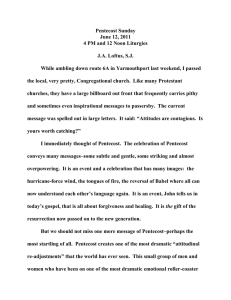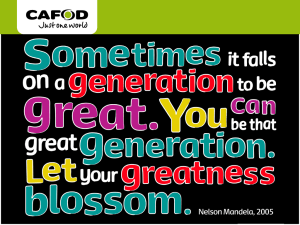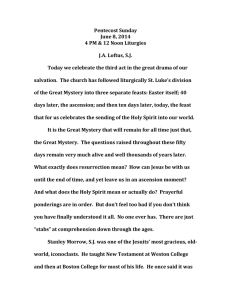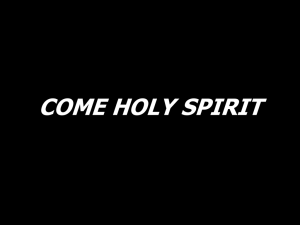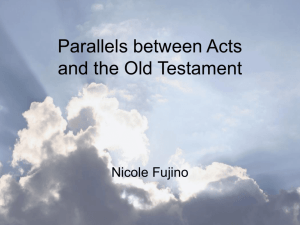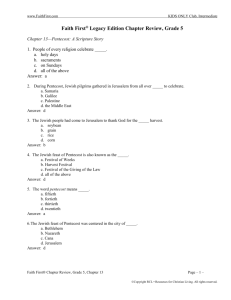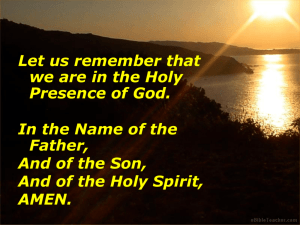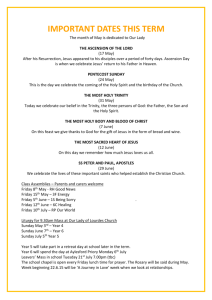Pentecost Sunday May 19, 2013 4 PM and 12 Noon Liturgies
advertisement
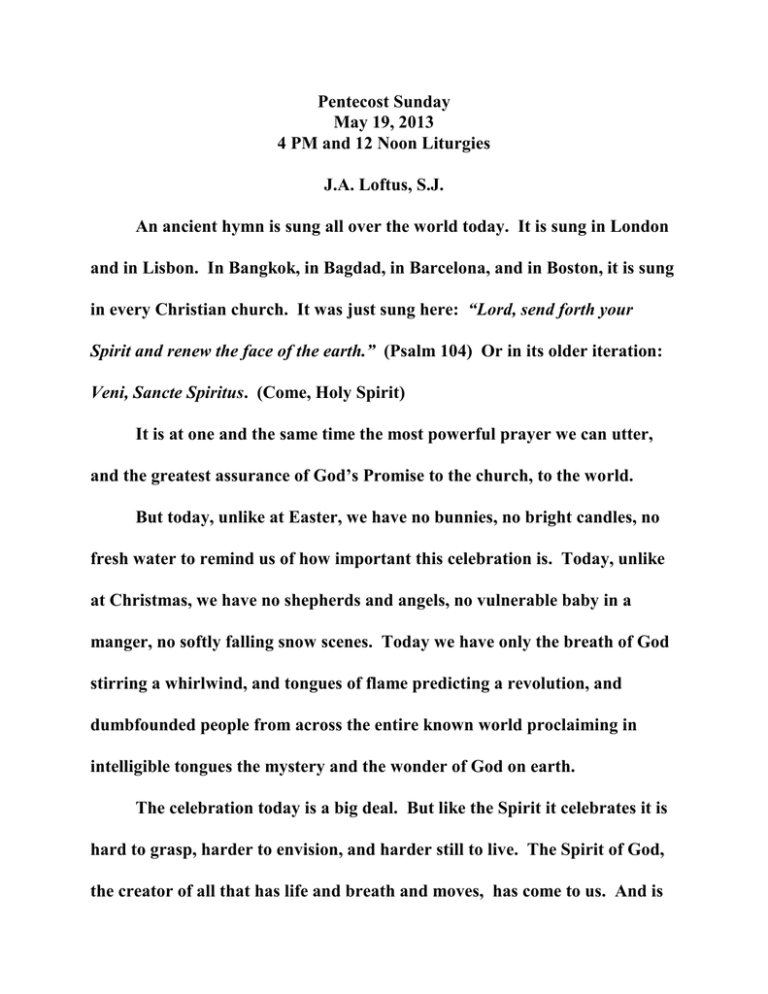
Pentecost Sunday May 19, 2013 4 PM and 12 Noon Liturgies J.A. Loftus, S.J. An ancient hymn is sung all over the world today. It is sung in London and in Lisbon. In Bangkok, in Bagdad, in Barcelona, and in Boston, it is sung in every Christian church. It was just sung here: “Lord, send forth your Spirit and renew the face of the earth.” (Psalm 104) Or in its older iteration: Veni, Sancte Spiritus. (Come, Holy Spirit) It is at one and the same time the most powerful prayer we can utter, and the greatest assurance of God’s Promise to the church, to the world. But today, unlike at Easter, we have no bunnies, no bright candles, no fresh water to remind us of how important this celebration is. Today, unlike at Christmas, we have no shepherds and angels, no vulnerable baby in a manger, no softly falling snow scenes. Today we have only the breath of God stirring a whirlwind, and tongues of flame predicting a revolution, and dumbfounded people from across the entire known world proclaiming in intelligible tongues the mystery and the wonder of God on earth. The celebration today is a big deal. But like the Spirit it celebrates it is hard to grasp, harder to envision, and harder still to live. The Spirit of God, the creator of all that has life and breath and moves, has come to us. And is still coming to us. It is the great Spirit of truth. She is the ancient Spirit of Wisdom. It is the Paraclete, the Advocate, the Defender of all that lives and loves. This is the breath, the passion, the fire of the living Lord Jesus. Veni, Sancte Spiritus. If, as I have mentioned throughout the past fifty days, if Easter is a verb, then Pentecost is the exclamation point at the end. Pentecost reminds us that Easter is an invitation, a challenge, a mission to each one of us. We are sent, commissioned again today to proclaim the saving power of God to our world. All of us and each of us. Too often sermons on this day speak only of the “birthday” of the church. And it is. But we are not here to play some “pin-the-tail-on-the donkey” game whilst we await some cake and ice-cream. It is not that kind of quiet birthday party. It’s meant to be an explosion–like the fireworks that conclude our 4th of July Esplanade concerts. That’s what it’s meant to be. So why does it seem to so many to be just another day when the priest wears red and the liturgy goes long? Our new Pope, Francis, addressed the same question just last Wednesday at his general audience with 80,00 people in the Vatican. God gives the Holy Spirit again every day to the church, he said. But can we hear 2 it? Do we ask for the Holy Spirit to come into our own hearts every day? He then asked the crowd: “well do you?” And they shouted back “yes.” In his characteristic style these days, he pulled his ear lobe and said: “I can’t hear you?” They shouted even louder. Don’t forget that, he said, and “remember that there are no part-time Christians; faith is a full-time job.” Veni, Sancte Spiritus. It is hard work sometimes to listen for the Spirit blowing again in the wind. It is work, and a commitment we are asked to make. The first Pentecost seems to have happened rather miraculously. They didn’t have to do anything. It just happened to them. I’m afraid those days are gone for now. We need to be active listeners, and discerning believers. The gift of that first Pentecost reversed the curse of the Tower of Babel in the Book of Genesis. Remember: all the people gathered at the tower but no one could understand each other. Pentecost reverses that individualism and separateness. On that first day of Pentecost everybody understood each other and accepted the diversity and differences among them, and they celebrated inclusiveness. Today that is hard work! I had a recent experience that reminded me of Pentecost. Last week I was traveling on a train in the Scottish Highlands. We were a mini League of 3 Nations: people from Russia, Spain, France, Italy, Wales, Belgium, Japan, and Indonesia–all with different languages. (I may even be missing some locales.) To say English was a “common” language would be a stretch. Most muddled along trying to speak English, but everyone had to pitch in and adjust. It was work sometimes, but in the process we actually understood each other and became friends. We were together exploring some of the most beautiful countryside any of us had ever seen. And it needed to be shared. So we worked at a common language that was often part French, part Spanish, part Italian, and even occasionally, part Russian. It worked! That experience was our very own Babel experience. It was an invitation, a challenge, and a gift to be shared. That is what the real Pentecost is about. It is a mandate, really. And there is a sobering challenge to the mandate. The great 16th century mystic, St. Teresa of Avila reminds us: “Christ has no body now on earth but ours. No hands but ours, no feet but ours. Ours are the eyes through which the compassion of Christ Looks out on the world; Ours are the feet with which He goes around doing good. Ours are the hands with which He blesses us now.” 4 Veni, Sancte Spiritus. “As the Father has sent me, so I send you.” To “be sent” by Jesus calls for courage and stamina. It will take plain old hard work and gut-wrenching desire from each of us to really accept each other. It requires an ability to forgive and to accept differences that seem all too often insurmountable. But please, join your hearts to the voices of the great throng of saints who still sing the ancient hymn down through the centuries. Veni, Sancte Spiritus. Come Holy Spirit and renew the face of the earth. Alleluia. Peace! 5
